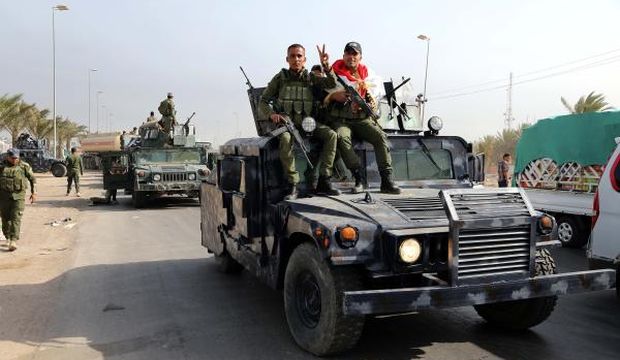
Iraqi security troops from Baghdad head to Ramadi on the orders of Prime Minister Haider Al-Abadi to reinforce troops there in their fight against the Islamic State of Iraq and Syria, on April 18, 2015. (AP Photo/Karim Kadim)
Ramadi, Asharq Al-Awsat—Fierce street battles erupted in the Iraqi city of Ramadi on Sunday between government forces backed by local tribal volunteer groups and fighters from the Islamic State of Iraq and Syria (ISIS), according to Iraqi security officials.
Maj. Gen. Kazim Al-Fahdawi, the head of the police force in Iraq’s western Anbar province, whose capital is Ramadi, told Asharq Al-Awsat that Iraqi forces and volunteer groups had blocked an assault by ISIS on the Anbar government building complex in the city.
“Fierce battles have erupted between our security forces backed by the heroes belonging to local tribal groups and fighters from ISIS. We have inflicted heavy losses on the extremist group, which have forced their fighters to flee,” he added.
Fahdawi also said airstrikes by the US-led anti-ISIS coalition had increased in recent days and have been targeting ISIS-held positions throughout the city, helping Iraqi forces inflict losses on the ground against the extremist group.
Meanwhile, Brig. Gen. Nasser Al-Fartousi, the head of Iraq’s Rapid Reaction Force, told Asharq Al-Awsat more units from the Iraqi military would be heading to the city in the coming days in order to participate in what he referred to as an “operation to liberate the city from ISIS.”
“Those forces that have already arrived in Ramadi are trained in street and urban warfare, and were involved in expelling ISIS fighters from the Anbar government building complex in the center of the city, which has helped secure routes into the city for reinforcements,” he also said, adding that the city was “no longer under immediate threat from ISIS.”
The extremist group has occupied parts of Ramadi and other areas of the Anbar province since January of 2014, even before its advance on Iraq’s second city Mosul—253 miles (407 kilometers) north of Ramadi—in June of 2014, and which catapulted the group into the international media spotlight.
In recent weeks Iraqi forces backed by tribal groups have successfully liberated several former ISIS strongholds including late Iraqi dictator Saddam Hussein’s hometown Tikrit and the Baiji oil refinery, the country’s largest.
There have been to-and-fro battles between Iraqi forces and ISIS for control of the refinery, with ISIS announcing last week it had captured the installation. But Iraqi forces backed by coalition airstrikes managed to retake the refinery on Saturday.
Despite the bullish sentiments expressed by Iraqi military leaders in recent weeks regarding their progress against ISIS, the country’s Vice President Iyad Allawi said the security situation in many parts of Iraq remained dire and criticized the government and armed forces for the way they have dealt with the threats.
“The government and the military are responsible for the dangerous security situation in Anbar. They must take immediate action to amend this catastrophic situation which Anbar especially and Iraq in general are experiencing,” he told Asharq Al-Awsat
Referring to accusations of alleged human rights abuses committed by volunteer Shi’ite militias, who are helping in the fight against ISIS, against civilians in Sunni-dominated Anbar, he said the danger in the province was now “real due to the silence regarding the [human rights] breaches.”
He also referred to a sudden withdrawal of police and government forces from Ramadi three days ago, as well as alleged failures by the government to adequately arm local tribal groups, as “a clear conspiracy to open the way for ISIS” to enter other parts of the city which it did not previously control.
